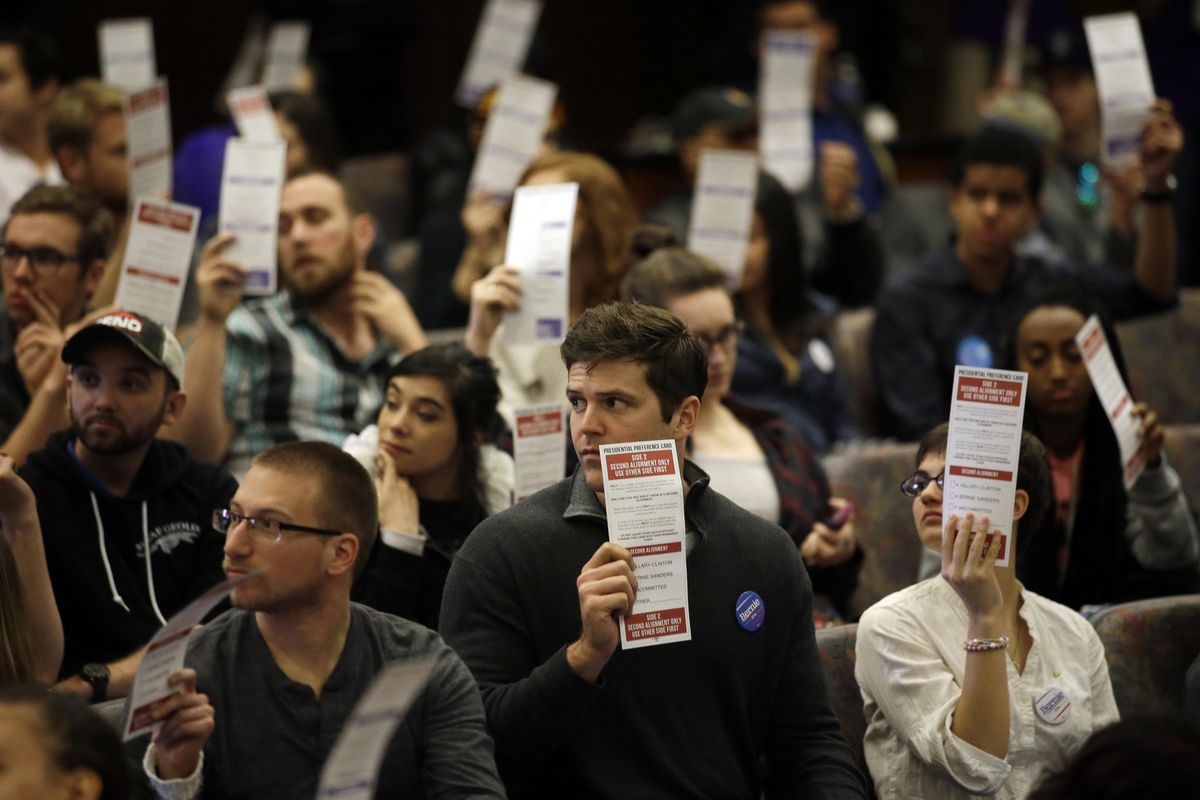Exit polls: Donald Trump holds own in deeply religious South Carolina

WASHINGTON – Businessman Donald Trump held his own among South Carolina’s deeply religious voters and won big among those who want an outsider as the next president, according to exit polls conducted by Edison Research for the Associated Press and television networks.
In Nevada, older women turned out in force to support former Secretary of State Hillary Clinton in that state’s Democratic caucuses, and she won a majority of non-whites. But she continued to struggle to gain the support of younger women, according to entrance polls conducted among those arriving at caucus sites Saturday.
A closer look at Democratic caucus-goers in Nevada and Republican primary voters in South Carolina:
Trump leads narrowly among Evangelicals
Seven in 10 South Carolina voters described themselves as born-again Christians and over 4 in 10 said it matters a great deal that a candidate shares their religious beliefs – both increases from 2012. But while Texas Sen. Ted Cruz led slightly among those who cared most about a candidate sharing their beliefs, Trump led slightly among those who said they were born-again Christians.
Trump did especially well among men, and led Cruz and Florida Sen. Marco Rubio among voters without a college degree, the exit poll showed.
Older women key in Nevada
In Nevada’s Democratic caucuses, women were more likely to support Clinton and men to support Sanders, the entrance poll there showed. Sanders gained the support of 7 in 10 caucus attendees under 45 and Clinton of two-thirds of those age 45 and over.
Seven in 10 women under 45 supported Sanders. But two-thirds of caucus-going women were 45 and over, and 7 in 10 of them supported Clinton.
A large majority of black caucus-goers supported Clinton, while whites and Hispanics were more evenly divided.
Sanders was supported by 7 in 10 caucus attendees who self-identified as independents, but they made up just 2 in 10 of all caucus attendees. Clinton was supported by nearly 6 in 10 self-identified Democrats.
Trump leads angry voters
About half of South Carolina Republican primary voters said they were dissatisfied and 4 in 10 said they were angry about how Washington is working. Trump led the angry voters, while those who were just dissatisfied split between the top three candidates.
Voters split on whether the next president should be an outsider or a member of the political establishment. Trump won the votes of 6 in 10 of those wanting an outsider, while Cruz and Rubio were tied for the lead among those wanting someone with experience.
Cruz led among voters who cared most about having a candidate who shares their values, while those looking for a candidate who can bring change preferred Trump. Those who wanted a candidate who “tells it like it is” were important to Trump – they made up a small proportion of the electorate, but he was supported by three-quarters of them. About half of those who cared about electability in November voted for Rubio.
More than 4 in 10 Republican primary voters said Trump is the candidate they trust most to handle the economy, significantly more than said so of any other candidate.
Nearly half of primary voters supporting Trump said they would not be satisfied with any other candidate as the nominee, while more than 7 in 10 Rubio and Cruz voters said they could be satisfied with a different candidate.
Clinton for experience, Sanders for honesty
As was the case for caucus-goers in Iowa and primary voters in New Hampshire, Nevada Democratic caucus attendees who cared most about voting for a candidate who’s honest and trustworthy or one who cares about people like them overwhelmingly supported Sanders, while whose looking for experience or electability overwhelmingly backed Clinton.
Clinton won a majority of those who said the economy or health care were their top issues, while those who said income inequality supported Sanders.
About half of caucus attendees said they think the next president should generally continue President Barack Obama’s policies, while about 4 in 10 said they want the next president to have more liberal policies. Among those who wanted a continuation of Obama’s policies, most came to support Clinton. Among those who want more liberal policies, most support Sanders.
Republicans want Muslim ban
Just over half of South Carolina GOP primary voters said immigrants who are living in the country illegally should be offered a chance to apply for legal status, and those voters tended to prefer Rubio. More than 4 in 10 said they should be deported back to their country of origin, and they were most likely to back Trump.
There is no such division among the Republicans on the issue of allowing Muslims into the country. About three-quarters support a temporary ban on Muslims who are not American citizens from entering the country, and those voters were most likely to support Trump.
The surveys were conducted for The Associated Press and the television networks by Edison Research as Republican voters left their polling places at 35 randomly selected sites in South Carolina and as Democratic voters arrived at 25 randomly selected caucus sites in Nevada. In Nevada, the results include interviews with 1,024 Democratic caucus-goers and have a margin of error of plus or minus 4 percentage points. In South Carolina, the preliminary results include interviews with 2,007 Republican primary voters and have a margin of sampling error of plus or minus 4 percentage points.
- - - -
Updates first paragraph and adds new data throughout.